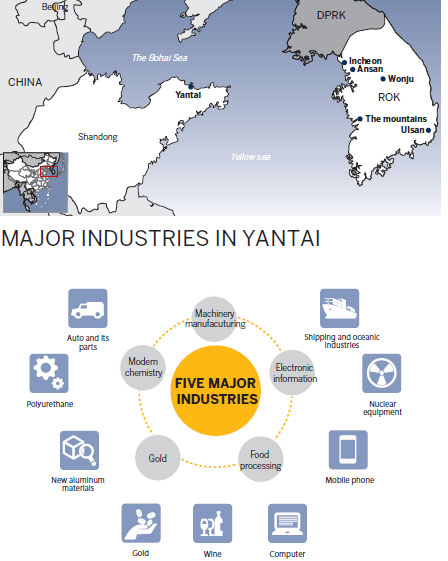Park in Yantai Set to be Economic Cooperation Model
Date: 2016-08-10, Source: China Daily, Total Visits :
Yantai aims to become major investment destination for Republic of Korea firms thanks to new industrial park and free trade agreement with the ROK The China-ROK Yantai Industrial Park is set to become a model project for economiccooperation between China and the Republic of Korea after the signing of the China-ROK FreeTrade Agreement in June last year. According to the FTA, the China-ROK Yantai Industrial Park and the Saemangeum DevelopmentZone in the ROK will be the major destinations for bilateral investment, trade cooperation andinformation exchanges. Entrepreneurs from the ROK had moved rapidly to seek development opportunities in the park.During the first five months of this year, a batch of ROK-backed projects had establishedfacilities in the park, bringing the contractual investments from ROK enterprises to $166 million, ayear-on-year growth of 143.6 percent, according to the commerce bureau of Yantai. AsianaAirlines Inc is among the ROK firms backing projects in the park. Zhang Yongxia, mayor of Yantai, said the government will continue to foster an internationalbusiness environment by streamlining customs clearance procedures and making marketaccess easier for foreign companies. "We aim to develop the industrial park into the best investment destination in China for SouthKorean enterprises and the largest distribution center for South Korean goods in China," saidZhang. Covering 32 square kilometers, the China-ROK Yantai Industrial Park consists of two parts,focusing on bioscience, intelligent manufacturing, auto manufacturing, marine technology andhigh-end service industries. The 10-sq-km eastern part is dedicated to the modern service industry while the 22-sq-kmwestern part focuses on advanced manufacturing and port-related industries. "The park will promote the industrial upgrading of both sides," said Yu Dong, director of thecommerce bureau of Yantai. Lauren Jee-enn of Yantai Luye Bobath Rehabilitation, a joint venture between Luye MedicalGroup in Yantai and Bobath Memorial Hospital in Seoul, said the Yantai branch, which includesdepartments of rehabilitation, neurology, traditional Chinese medicine and nursing, hasexpanded Bobath's business chain. Yu said Yantai boasts convenient transportation links and solid industrial foundations to promotethe park's cooperation with the ROK. Facing the ROK across the Yellow Sea, Yantai, through its international airport, operates morethan 120 flights to and from Inchon and Pusan in the ROK every week, and 13 ships run weeklybetween the Port of Yantai and major ROK ports including Inchon and Pyeongtaek. Roughly 50,000 people from the ROK live and work in the city and it has sister city relationshipswith five ROK cities, including Inchon and Kunsan. Yantai's pillar industries, such as machinery manufacturing, electronic information and foodprocessing, as well as emerging industries including equipment manufacturing, energy-savingand environment protection, creativity and animation design are in tune with the ROK's industrialstructure. The ROK has developed into Yantai's main foreign trade partner and its largest source of foreigncapital and tourists. The city's foreign trade with the ROK reached $11.08 billion last year. Nine Fortune 500 companies from ROK including LG, Doosan and Hyundai have establishedbranches in Yantai. "The park aims to become an international-class industrial park that integrates the functions ofdeveloping industrial clusters, entrepreneurship and free trade by 2025," said Yu. To reach this goal, Yantai's government, as well as the Shandong provincial government, hasintroduced preferential finance, trade, investment and shipping policies to support companies inthe park. The Yantai government has also established a 1 billion yuan ($149.6 million) development fundfor the China-ROK Yantai Industrial Park to build infrastructure and support startups andinnovations. Statistics show the park has helped Yantai attract $5.56 billion worth of ROK investments for3,651 projects, mainly in the construction machinery, auto and other advanced manufacturingindustries, as well as the energy-saving and biotechnology sectors. The Yantai China-Republic of Korea ferry vows to boost its services from Yantai to the ROK.

